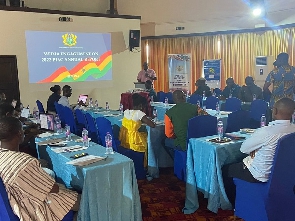The Public Interest and Accountability Committee (PIAC) has engaged Media personnel across the country to discuss the 2022 PIAC Annual Report on the management and use of petroleum revenues, as well as other petroleum revenue management-related issues in Ghana, Purefmonline.com reports.
The two-day program which is being held in Cape Coast- Central region, highlights that since the start of petroleum production in the country in 2010, the government has for the first time recorded the highest petroleum revenue for a single year in 2022 despite significant decline in production volumes.
Data from the PIAC report as presented to the various media personnel including managing news editors and morning show hosts/Producers in the country showed that petroleum receipts for 2022 amounted to $1.43 billion, representing an increase of 42 per cent over the projected revenue for the year and 82.38 percent higher than the receipts for 2021 of $783.33 million.
A member of PIAC, Suleman Anderson noted in the report’s presentation that "Despite our higher increased in revenue in 2022, the country had a shortfall of over 3.5Million barrels of crude as compared to the 2021 data
“Ghana produced 51.7Million barrels of crude from its 3 oil fields in 2022, whilst in 2021, we produced 55.05 barrels of crude.”
He indicated further that apart from 2022’s $1.43 billion in receipts, government’s highest annual receipts from petroleum production have been $978.02 million in 2014 and $976.09 million in 2018, with 2016 bringing the lowest revenue receipts of $247.18 million since 2011.
Alhaji Suleman explained again that the sharp rise in Petroleum revenue for the year 2022 was attributable to the increase of Crude prices on the world market.
“The significant rise in revenue in 2022 was mainly due to the sharp increase in the price of crude oil on the world market occasioned by the Russia-Ukraine war and favourable international crude oil prices which were higher than estimated prices.
"The Russia-Ukraine war only gave us trouble downstream but compensated us in the upstream level for the losses we incurred in the downstream”, he said.
PIAC observed that in the use of the revenues generated from the oil production, the Ghana National Petroleum Commission (GNPC) mainly appropriated the funds on projects that are not in its remit and which are better covered by the finances of the central government, warning that the Commission should stick to its mandate and guard against the reckless use of our oil revenues.
“GNPC’s expenditure on various line items, mainly administrative expenditure and its capital projects, witnessed significant increases by more than 200 percent in 2022
"GNPC’s continued funding of the construction of roads in the Western Corridor enclave constitutes quasi-fiscal expenditure, and should be the responsibility of the central government. The total expenditure by GNPC on these roads since 2014 is $124.66Million
Given that petroleum revenues recorded a historic high in 2022, GNPC should manage its expenditure and build buffers against volatilities in petroleum revenue inflows in the future so as to not deny areas like the District Assembly Common Fund of rightful money needed for infrastructure development and governance at the local level”, it stated.
The Public Interest and Accountability Committee (PIAC) is an independent statutory body mandated to promote transparency and accountability in the management and use of petroleum revenues in Ghana.
The media engagement program on the report’s presentation is partnered by GIZ.
Business News of Saturday, 17 June 2023
Source: purefmonline.com

















